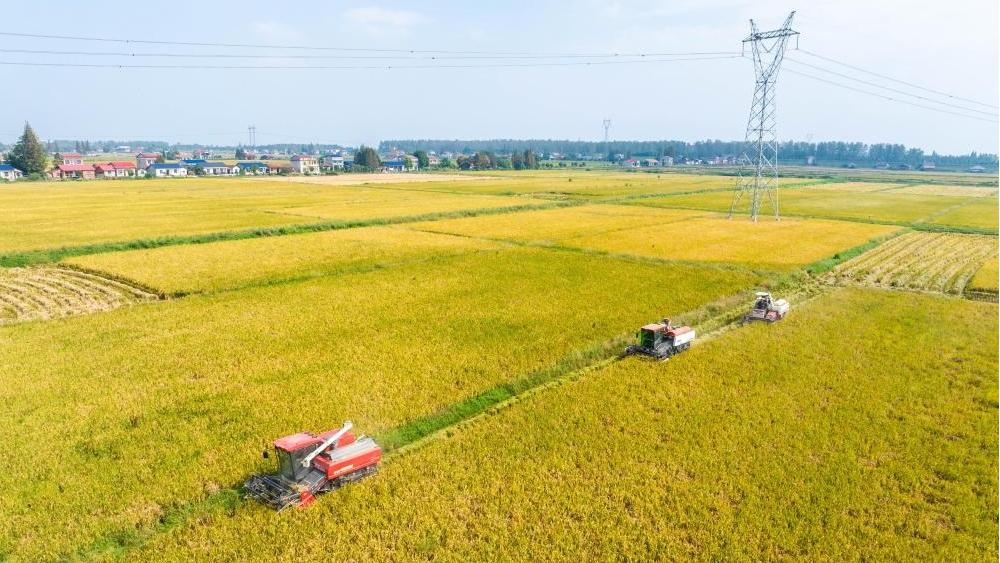Training program plants seeds for China-Pakistan agricultural cooperation
SANYA, Oct. 16 (Xinhua) -- On a breeding field in Yazhou Bay Science and Technology City in Sanya, south China's Hainan Province, trainees from Pakistan could recently be found observing the performance of advanced Chinese agricultural machinery.
These machines are equipped with autonomous driving systems developed by Chinese teams. Trainees took turns entering the machines to experience their capabilities.
These trainees are part of the Capacity Building of 1,000 Agricultural Graduates in China program launched by the leaders of China and Pakistan, for which the Pakistani government selected 1,000 agricultural professionals from Pakistan to study in China.
The program, which is hosted by the Chinese Academy of Agricultural Sciences (CAAS), aims to help Pakistani agricultural talent master advanced technologies, and to promote sustainable agricultural development in both countries. It has a duration of three months and will take place entirely in China. Of the trainees participating, 26 will spend most of their time at the CAAS National Nanfan Research Institute in Sanya.
From AI-powered glasses capable of identifying crop pests and diseases to an insect radar that precisely tracks migratory pest pathways, the advanced agricultural technologies and equipment in China have broadened the trainees' horizons.
"China's smart agriculture is developing rapidly, enabling AI management across the entire agricultural production chain, from sowing and cultivation to pest control and soil monitoring," said Iqra Noor, a horticulture researcher of the University of Health Sciences in Lahore, Pakistan. "The level of digitalization is very high."
The training program focuses on two main areas: fruit and vegetable processing, and agricultural mechanization. It also covers variety-breeding, pest and disease control, and agricultural product-processing. Teaching involves both theoretical instruction and substantial amounts of field visits, laboratory work and practical field exercises, ensuring participants acquire practical skills.
Ifrah Mehmood, a fruit and vegetable production manager at a Pakistani agricultural company, said that China has developed many innovative technological solutions for long-standing farming challenges. She expressed her hope that she could be a bridge connecting Chinese research capabilities with Pakistani enterprises and farmers, and that she could introduce agricultural transformation and upgrading projects, including projects to apply technologies to precision agriculture and greenhouse cultivation.
In turn, the trainees have left a good impression on Chinese experts. "They are not just coming to gain knowledge. They come with specific questions about their own country's agricultural development," said Li Huihui, deputy director of the CAAS National Nanfan Research Institute. "For example, during practical agricultural machine sessions, they repeatedly asked about operational efficiency, maintenance costs and operational difficulty."
The program sows seeds of cooperation between China and Pakistan. Li noted that observing agricultural models suited to tropical and subtropical climates in Hainan has boosted the trainees' confidence in promoting new technologies in Pakistan. Joint fieldwork and problem-solving have also fostered deep friendships between researchers from both sides, Li said, adding that the trust built on these shared practices forms the strongest possible foundation for future long-term cooperation.
As World Food Day falls on Thursday, the trainees engaged in discussions and exchanged ideas on how to collaborate to enhance global food security resilience. "Ensuring food security is a common challenge facing all countries, which requires cooperation in research, production, trade, and especially the sharing of technology and knowledge," said Syed Anis Ur Rehman, a researcher from Quetta in the Pakistani province of Baluchistan.
For many of the trainees, participating in the program is just the beginning of their cooperation with China. Many have expressed interest in pursuing doctoral or postdoctoral research in China in the future. Syed Anis Ur Rehman has already connected with Chinese experts to discuss his plans to study in China.
"Currently, my focus is on completing the training program successfully. After the training, Chinese professors will conduct a comprehensive evaluation, and with outstanding results, I might receive a recommendation," he said.
Photos
Related Stories
- China's rare earths export control measures have no connection with Pakistan: spokesperson
- Pakistan receives first batch of flood relief supplies from China
- A Pakistani scholar's vision: driving China-Pakistan exchanges in big data
- Global Governance Initiative showcases China's vision for human progress, international harmony: Pakistani official
- Global Governance Initiative contributes Chinese solution to improving global governance, says Pakistani official
Copyright © 2025 People's Daily Online. All Rights Reserved.









